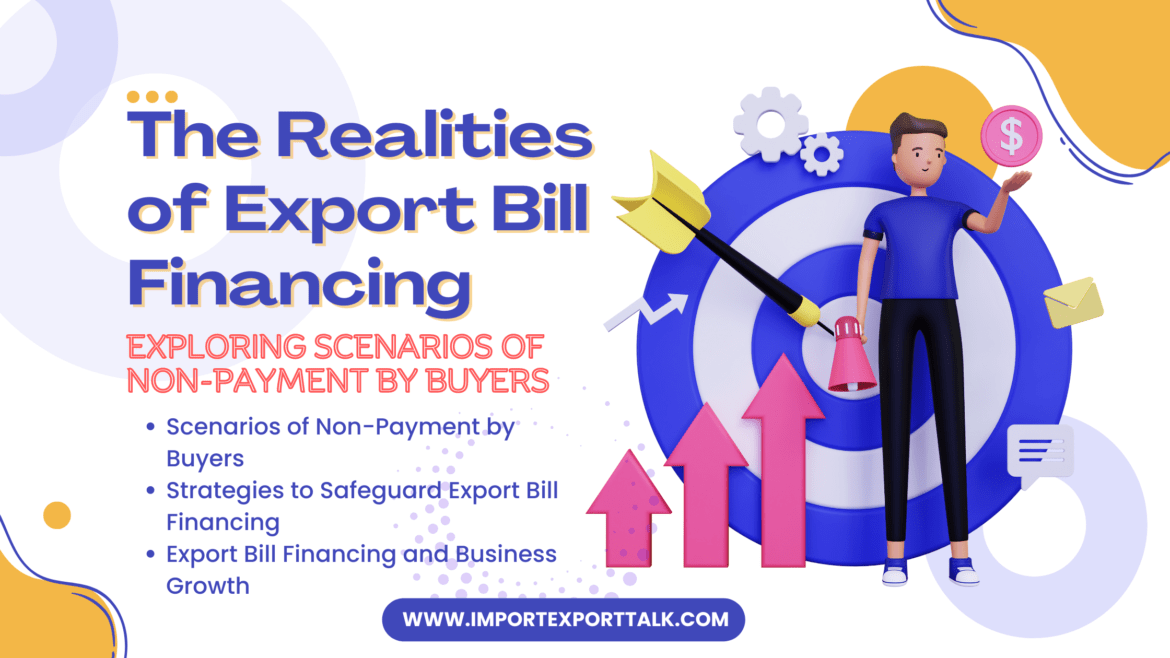The realities of export bill financing and the scenarios that exporters may face when buyers fail to honor their financial commitments. Exporting offers a world of opportunities for businesses to tap into new markets and expand their horizons. However, along with these opportunities come certain risks, and one of the foremost concerns for exporters is the possibility of non-payment by buyers.
The Realities of Export Bill Financing
Export bill financing, also known as export receivables financing, is a crucial financial mechanism that allows exporters to access immediate funds based on the invoices they have raised for their overseas buyers. This mechanism provides liquidity to exporters, bridging the gap between the delivery of goods and the receipt of payment.
Exploring Scenarios of Non-Payment by Buyers
1. Buyer Default:
Buyer default occurs when the overseas buyer fails to make the payment as agreed upon in the contract. This could be due to financial difficulties, insolvency, or other unforeseen circumstances. Such situations can leave exporters facing liquidity crunches and operational challenges.
2. Disputed Invoices:
In some cases, buyers may dispute the invoices raised by exporters. This could be due to quality issues, discrepancies in delivery, or disagreements over contractual terms. Disputed invoices can lead to delayed or withheld payments, impacting the exporter’s cash flow.
3. Economic Downturns:
Global economic downturns or economic instability in the buyer’s country can result in delayed payments or non-payment. Exporters need to be prepared for the impact of macroeconomic factors on their overseas buyers’ ability to meet their financial obligations.
4. Political Unrest:
Political unrest, changes in government policies, or international sanctions can disrupt trade flows and impact buyers’ ability to make payments. These scenarios are beyond the control of exporters but can have direct financial consequences.
Navigating Non-Payment Scenarios
1. Diligent Risk Assessment:
Before engaging with overseas buyers, exporters must conduct thorough due diligence. This includes assessing the financial health and reputation of the buyers to minimize the risk of non-payment scenarios.
2. Diversification of Markets:
Relying heavily on a single market or buyer can amplify the impact of non-payment. Exporters should diversify their customer base and explore multiple markets to distribute risk.
3. Export Credit Insurance:
Export credit insurance, offered by institutions like ECGC, provides a safety net against non-payment scenarios. Exporters can secure insurance coverage that mitigates the financial impact of buyer defaults.
4. Legal Recourse:
In extreme cases of non-payment, exporters may need to explore legal options to recover their dues. Having a well-documented contract and understanding the legal framework of the buyer’s country is crucial.
Strategies to Safeguard Export Bill Financing
1. Robust Contractual Agreements:
A well-drafted and comprehensive contract between the exporter and the overseas buyer is essential. The contract should clearly outline payment terms, delivery schedules, quality standards, and dispute resolution mechanisms. A strong contractual framework minimizes the chances of misunderstandings and disputes.
2. Invoice Verification:
Before submitting invoices for financing, exporters should ensure that the invoices accurately reflect the goods delivered or services provided. Inaccurate or inflated invoices can lead to disputes and delays in payment processing.
3. Timely Documentation:
Exporters must maintain meticulous documentation of all export-related transactions, communications, and agreements. These documents serve as evidence in case of disputes or non-payment scenarios.
4. Regular Communication:
Maintaining open lines of communication with overseas buyers is crucial. Regular updates on order status, delivery schedules, and payment reminders can foster transparency and accountability.
Export Bill Financing and Business Growth
Export bill financing, despite the potential risks of non-payment, remains a vital tool for export-driven businesses. When managed prudently, it offers several benefits:
1. Cash Flow Optimization:
Export bill financing injects immediate liquidity into the exporter’s business. This ensures that operational expenses are met on time, and growth plans are not hindered by delayed payments.
2. Faster Business Cycles:
With access to funds through export bill financing, exporters can accelerate their business cycles. They can accept larger orders, expand production capacity, and explore new markets with confidence.
3. Reduced Financial Strain:
Non-payment scenarios can strain a business’s finances. Export bill financing provides a buffer against such scenarios, allowing businesses to weather uncertainties without compromising their operations.
4. Competitive Advantage:
Export bill financing can confer a competitive advantage by enabling exporters to offer flexible credit terms to buyers. This can attract more buyers and strengthen relationships with existing ones.
FOREIGN CURRENCY EXPORT CREDIT & CUSTOMER SERVICE TO EXPORTERS
Export bill financing is a dynamic tool that empowers exporters to leverage their receivables and drive business growth. While the possibility of non-payment by buyers is a reality, exporters can proactively manage this risk through strategic planning, due diligence, and risk mitigation strategies.
The key lies in finding the right balance between seizing international opportunities and safeguarding financial stability. With the right mix of risk management, contractual diligence, and timely communication, exporters can harness the potential of export bill financing to not only navigate challenges but also propel their businesses to new heights of success.
Effective Labeling and Marking Elevate Export Business Success


1 comment
The realities of export bill financing